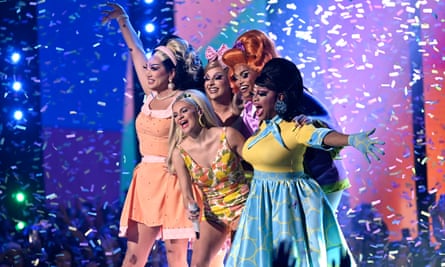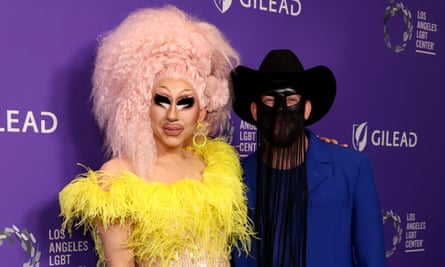“The energy was honestly like nothing I’ve ever experienced,” recalls the drag performer Britney Banks of her recent surprise appearance at a Lizzo concert at Knoxville, Tennessee’s Thompson-Boling arena. “The roof could have come off.”
Banks is referring to the moment she and a group of fellow performers were invited onstage by Lizzo for a performance of the star’s 2022 song Everybody’s Gay in direct defiance of the restrictive anti-LGBTQ+ laws and sentiment bubbling up in the state.
“We came from backstage and walked out on two separate sides,” says Banks. “We were only out there for a minute and a half, but it was the craziest feeling I’ve ever felt.”
As the audience cheered, Lizzo spoke candidly into the microphone about the meaning of the moment. “In light of recent tragic and current events, I was told, ‘Cancel your shows in Tennessee,’” the Grammy-winner said. “But why would I not come to the people who need to hear this message the most? Why would I not create a safe space in Tennessee where we can celebrate drag entertainers?”
Allow Instagram content?
This article includes content provided by Instagram. We ask for your permission before anything is loaded, as they may be using cookies and other technologies. To view this content, click ‘Allow and continue’.
Lizzo is part of a larger trend emerging in Tennessee of major music stars using their platform to raise awareness for the drag and LGBTQ+ community at large in light of a flurry of legislation in the southern US which directly attacks trans people and drag performers, including legislation signed by the Republican governor of Tennessee, Bill Lee, which restricts “adult cabarets”. While that specific law has since been temporarily blocked, artists ranging from Hayley Kiyoko to Orville Peck and Kelsea Ballerini have used their tour stops to dedicate a portion of their performance to advocate against the anti-drag and trans sentiment emerging in the deep south of the US.
Kiyoko invited two drag queens from the Nashville watering hole Play Dance Bar to join her on stage the next night during her performance in the city at Marathon Music Works as part of her ongoing Panorama tour. “I was advised by local law enforcement that having a drag performance at my all-ages show could result in legal action,” she later wrote on social media, noting that an “undercover cop” delivered the warnings. “I never want to put anyone in a position to be at risk or in danger in any way. But also where is the line of being silenced?”
Drag performers LiberTea and Ivy St James made the decision to forge on, subsequently appearing on stage alongside Kiyoko without incident. “They showed no fear and said they wanted to continue with the show and come out onstage, so they did,” the singer later said.
“Lizzo and other artists reach audiences that many advocates can’t otherwise reach,” says Chris Sanders, executive director of the Tennessee Equality Project and the Tennessee Equality Project Foundation. “Their actions simultaneously tell huge numbers of people what is happening and show a path forward for fighting against authoritarian laws. When I saw the news of her creative approach to fighting our discriminatory laws, it was a moment of relief and happiness because it said that we’re not alone in Tennessee.”
Ballerini used her national platform at the CMT awards to invite drag performers, including Manila Luzon and Olivia Lux, on stage during her performance at the ceremony last month in Austin, Texas. “If you go down, I’m going down too,” the singer wrote on social media about the performance, alluding to her 2022 song of the same name.
Meanwhile, Orville Peck has made it a recurring theme in his show to invite drag performers on stage during a series of performances in the south. “[Drag] is a cornerstone of not just gay culture but gay civil rights,” he later told Variety. “It is literally why I have the ability to be an openly gay man in country music. Was I scared? Yes, but I did it anyway because sometimes you just have to do something no matter what.”
The Nashville-based drag performer Alexia Noelle Paris joined Peck on a run of six dates after being in touch on social media. “The crowd received my presence positively, and the energy felt different than just having me join on stage as a background performer,” said Noelle of the experience.
after newsletter promotion
“He truly gave me the spotlight to shine. It was nice to hear how much people enjoyed my performance or how I was their first drag experience. It also was great to show them that drag is not dangerous or something to fear, but simply an art.”
According to the president and CEO of Glaad, Sarah Kate Ellis, three dozen separate pieces of anti-drag legislation have emerged in 16 states in the past year alone. “Drag artists have been under unprecedented, baseless attacks from a small group of extremists,” she says. “What people see in the media and from entertainers has a huge impact on how they treat each other and the decisions they make every day in schools, living rooms, offices, courtrooms and all over our culture.”

For Banks, it was her association with the non-profit Inclusion Tennessee that led to the moment with Lizzo, which subsequently captured headlines around the world. “I couldn’t sit by any more,” says Banks, who has been performing in drag for the past six years. After Banks appeared at Nashville’s Love Rising benefit show, which was organized in reaction to the law and drew 10,000 people to Bridgestone arena, Lizzo’s team subsequently reached out to figure out how the star could make a statement.
“We had a week and half to book all the queens and later we rehearsed with her choreographer,” says Banks, who is currently in Los Angeles prepping a fundraising show for Inclusion Tennessee at Micky’s in West Hollywood, a direct result of her appearance in Knoxville. “It’s been a whirlwind but a really cool experience.”
According to Kate Ellis, the representation from coast to coast has powerful implications. “These artists, and performers, send a strong message to youth everywhere: no matter who you are, you are beautiful and you belong,” she says.

